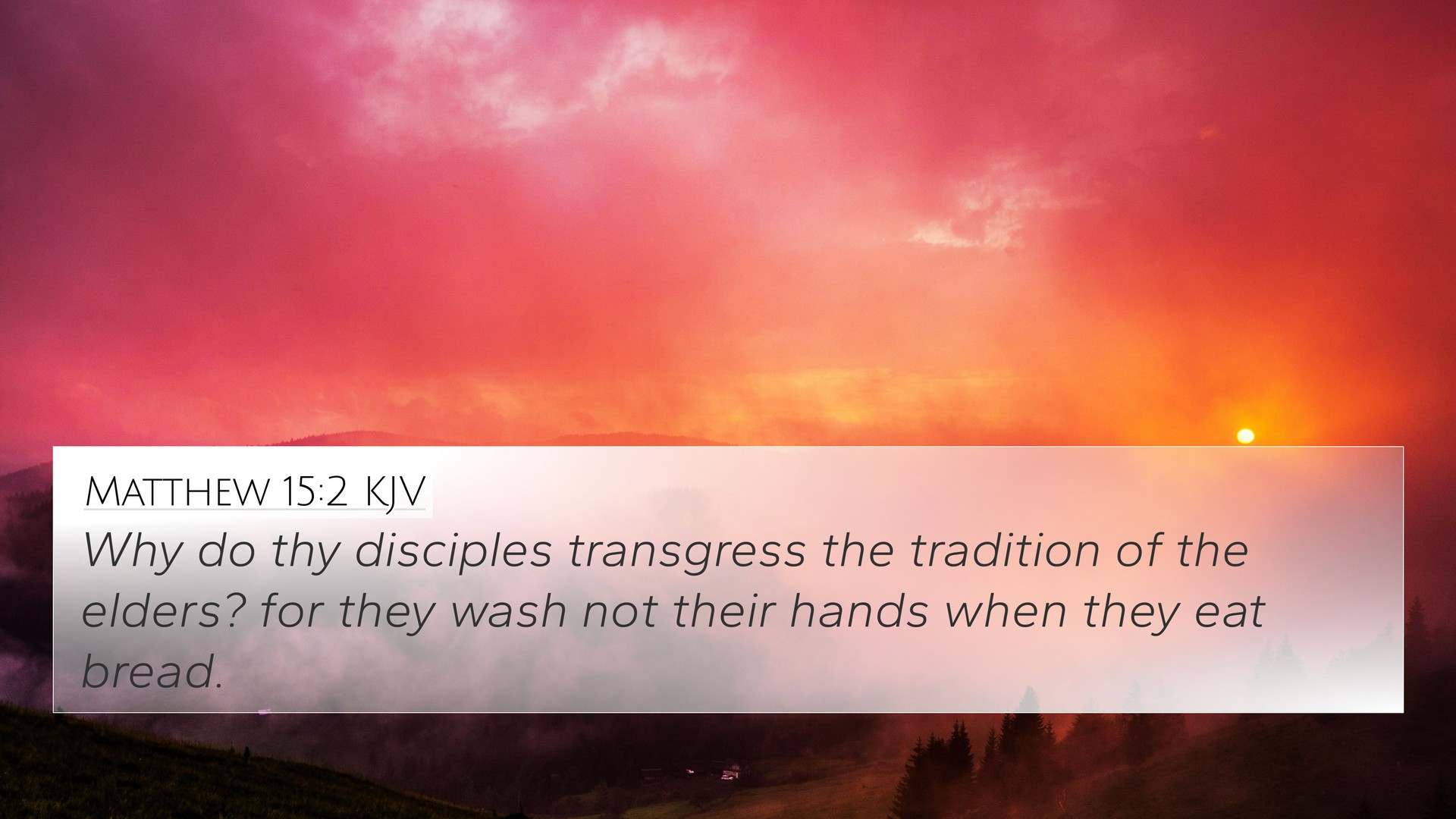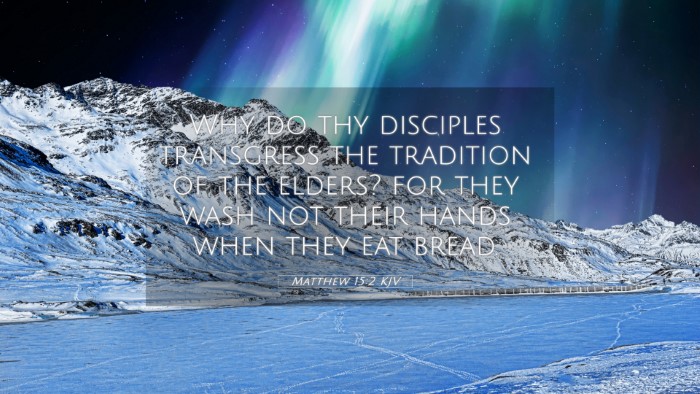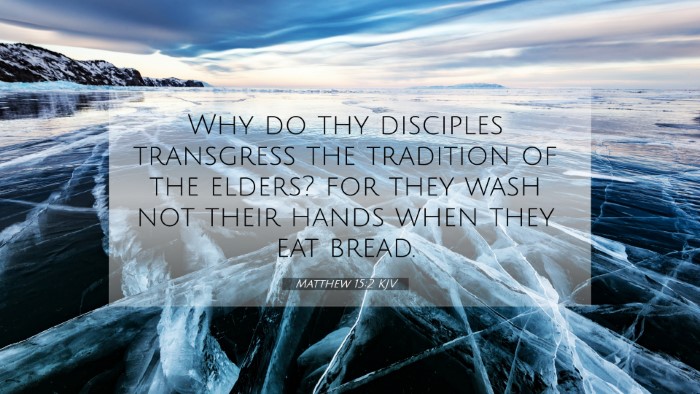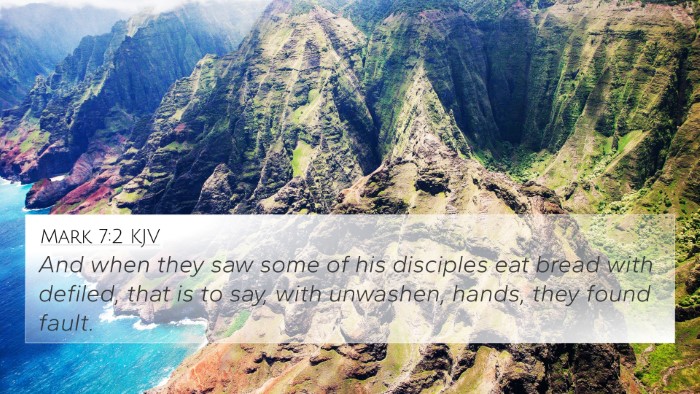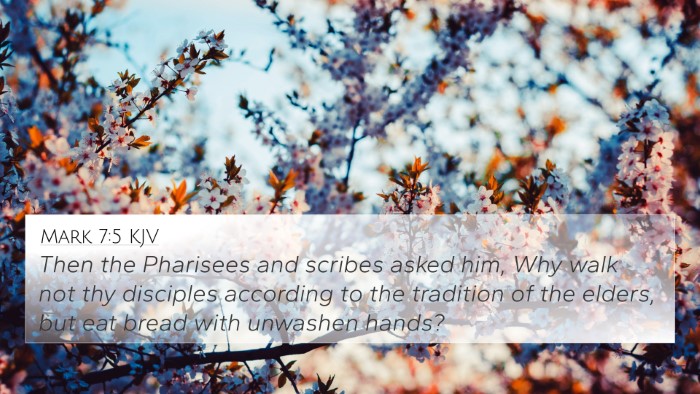Understanding Matthew 15:2
Matthew 15:2 states: "Why do your disciples transgress the tradition of the elders? For they wash not their hands when they eat bread." This verse highlights the conflict between the traditions of the elders and the commandments of God, revealing a critical aspect of Jesus' ministry.
Summary of Matthew 15:2
This verse captures an interaction between Jesus and the Pharisees, who question His disciples about their practice of not following traditional hand-washing rituals before meals. This question brings forth a significant discussion on the nature of traditions and their authority in relation to God’s commandments.
Commentary Insights
- Matthew Henry: Henry emphasizes that the Pharisees were more concerned about human traditions than divine laws. They judged the disciples' actions, illustrating the hypocrisy often found in focusing on minor external rituals while neglecting the weightier matters of true devotion and obedience to God.
- Albert Barnes: Barnes reflects on the significance of this tradition and its implications for worship. He asserts that while traditions can serve a purpose, they should never overshadow or contradict the commandments of God. Instead, the focus should be on purity of heart and true worship.
- Adam Clarke: Clarke further expands on the importance of external cleanliness, but he points out that it is the state of the heart that counts. He critiques the Pharisees' legalism, suggesting that such traditions can harm sincere faith and lead to a distorted understanding of God’s will.
Bible Verses Cross-References
Understanding Matthew 15:2 can be enhanced by exploring its connections with other Bible verses. Here are some related scriptures that provide deeper insights:
- Mark 7:5-8 - This passage parallels the account in Matthew and discusses the Pharisees’ focus on traditions over God’s commands.
- Isaiah 29:13 - This verse highlights the rejection of God’s commandments in favor of human teachings, echoing the situation described in Matthew 15:2.
- Colossians 2:8 - Paul warns about being deceived by philosophies and traditions that are contrary to Christ.
- James 1:27 - This verse emphasizes the importance of true religion being centered on purity and care for others rather than mere external rituals.
- Matthew 23:27-28 - Here, Jesus criticizes the Pharisees for their outward appearances versus the inner reality of their hearts.
- Titus 1:14 - Paul admonishes the church to avoid following Jewish fables and human commandments that turn people away from the truth.
- 1 Samuel 16:7 - God emphasizes that He looks at the heart, not at outward appearances.
Connections Between Bible Verses
The inter-Biblical dialogue created by these references indicates a thematic exploration of the relationship between human traditions and divine commands. The following points illustrate the comparative Bible verse analysis:
- Tradition vs Commandments: Matthew 15:2 juxtaposes the human traditions upheld by the Pharisees against the divine commandments, an enduring struggle within faith communities.
- Inner Purity vs External Rituals: The consistent biblical theme stresses the importance of heart purity over mere external compliance, as reiterated in various texts.
- Pharisaical Attitudes: The criticisms of the Pharisees are a recurrent theme in the Gospels, inviting believers to examine their own practices in light of faith.
How to Use Bible Cross-References
Utilizing a Bible cross-reference guide can deepen your understanding of scripture. Here are some helpful tips:
- Identify key themes or words in a verse to research related scriptures.
- Use digital or physical concordances that offer thematic search capabilities.
- Follow cross-reference notes typically found in study Bibles for comprehensive analysis.
- Engage in cross-referencing Bible study methods by comparing similar narratives or teachings across different books.
Closing Thoughts
Matthew 15:2 serves as a profound reminder to assess our own religious practices and beliefs. It challenges believers to consider whether they prioritize external traditions over the essence of faith and relationship with God. By examining the connections between this verse and others, we enrich our understanding of biblical teachings and the heart of God’s message to humanity.
